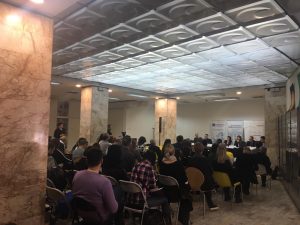BELGRADE, 30.03.2018. – The meeting was opened by Nataša Dragojlović, Coordinator of the National Convention on the European Union, Maja Stojanović, Executive Director of the Civic Initiatives and Coordinator of Intersectoral Group for Freedom of Expression and Media and Slobodan Krstović in front of NALED, as the Coordinator of the Working Group for Chapter 8 “Competition Policy”.
Maja Stojanović emphasized that freedom of the media and expression permeates many chapters in the negotiation process with the EU, and therefore Chapter 8, which relates to the competition policy. “Protecting media competition and controlling the granting of the state aid to the media is an extremely important area, to which more attention has to be paid,” Stojanović said.
The National Convention on the European Union, in its four years of work, has been recognized as a mechanism in which good dialogue can be conducted between the key actors in the negotiation process, said Nataša Dragojlović. She also pointed out that NCEU has solid evidence, based on serious analyzes and research, that the media situation is very bad, but that NCEU is ready to cooperate with the relevant institutions, to give their recommendations and suggestions so that the entire negotiation process would be more serious and more effective.
“The fair market and the improvement of the business environment would enable a better balance of financing of the media from public sources and the private sector, greater independence of the media and it would reduce the scope for arbitrary decisions in granting state aid,” said Slobodan Krstović. He underlined that the non-enforcement of regulations and legislative provisions in this area should not be the result of ignorance or political promotion.
Vesna Kovač, State Secretary at the Ministry of Trade, Tourism and Telecommunications, and Siniša Milošević, Head of the Economic Analysis Sector from the Commission for the Protection of Competition, spoke about the current situation in the area of media competition protection.
In the opinion of State Secretary Vesna Kovač, Chapter 8 is the most complex chapter, which will be last opened and last closed. She stressed that our legislative framework in the field of competition is largely harmonized with the EU acquis and that the draft Law on Protection of Competition is in the pipeline, which should eliminate all the shortcomings of the previous law in this field.
Siniša Milošević said that the media market is very specific and dynamic. “The Commission for the Protection of Competition did not conduct sectoral analyzes for this market because the legal provisions for this were not fulfilled, but that does not mean that the analysis will not be carried out in the future,” Milošević stressed.
Miloš Stojkovic, lawyer from Živković-Samardžić Law Office and Nemanja Nenadić, program director of Transparency Serbia, talked about the experiences and practices in the field of media competition at the meeting.
In the beginning, Stojković emphasized that the most important question is whether the media market exists at all. “There is no media pluralism in Serbia today, the offer is unclear, we do not have quality media content, while in recent years there has been a trend of progressive growth in the number of media.” Also mentioned were the main problems that the media in Serbia face today, such as privatization, reduction of state influence in the framework of project co-financing and regulation of business transparency. “The state has never completely emerged from the media sector, it is still a very active and influential individual player on the market,” concluded Stojković.
The event was also attended by the representatives of the State Aid Control Commission. The director of this institution, Andrijana Ćurčić, emphasized that the Commission has no jurisdiction in deciding which state aid is being granted, and that it is only a controller of the state aid award process. She pointed out that the State Aid Control Commission is ready for dialogue with the representatives of the civil society and other interested individuals on the subject of media competition protection.
Over 70% of registered media are national, and the future of the local media is not bright, it was noted at the meeting.
The meeting was finished with the conclusion that it is necessary to establish communication and cooperation between all competent state authorities and the media in order to improve the situation in this area and fulfill the conditions for the effective closure of Chapter 8. 
The Inter-sectoral Group of Freedom of Expression and Media and the Working Group for Chapter 8 of the National Convention on the European Union was held on 30 March 2018. in the Human Rights House. The meeting was attended by over eighty journalists and media associations from all over Serbia, as well as the representatives of relevant state institutions.
This project is funded by the European Union through the small grants programme “Protecting Media Freedom and Freedom of Expression in the Western Balkans” implemented by the Croatian Journalists’ Association as part of the regional project Western Balkan’s Regional Platform for Advocating Media Freedom and Journalists’ Safety, carried out through partnership of six regional journalists’ associations – Independent Journalists’ Association of Serbia (IJAS), Association of BH Journalists (BHJ), Croatian Journalists’ Association (CJA), Association of Journalists of Kosovo (AJK), Association of Journalists of Macedonia (AJM) and the Trade Union of Media of Montenegro (TUMM).










